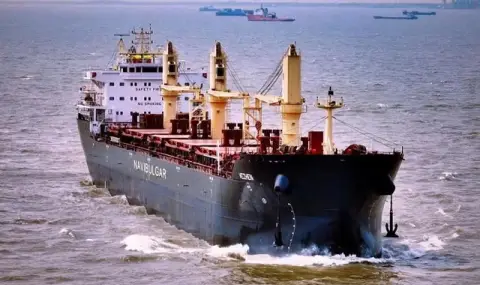Swedish authorities have released the Maltese-flagged Bulgarian ship "Vezhen", which was suspected of damaging an underwater fiber-optic cable between Latvia and Sweden on January 26, Reuters and the Associated Press reported, quoted by BTA.
"The investigation clearly shows that this was not a case of sabotage", the Swedish prosecutor's office said.
"It was found that a combination of weather conditions and deficiencies in the equipment and seafaring skills" of the crew contributed to the cable being cut, the statement noted.
"The investigation continues to establish whether other crimes were committed" in connection with the cable cut.
The Bulgarian shipping company "Navibulgar" ("Bulgarian Navy") denied allegations that one of its ships had deliberately cut the cable, AP recalls.
In recent months, there has been a series of incidents involving the cutting of data cables in the Baltic Sea. They are believed to be linked to the Russian fleet of tankers that help the country circumvent sanctions and continue to receive oil revenues.
"Bulgarian Navy" cited information from the crew that the ship was sailing in extremely bad weather conditions and the left anchor was dragging on the bottom.
As reported by BTA, a few days ago, the Swedish prosecutor's office said that it had launched a preliminary investigation "on suspicion of sabotage" under aggravating circumstances and ordered the detention of a ship in the Baltic Sea suspected of damaging an underwater fiber optic cable connecting Latvia and the Swedish island of Gotland. The Swedish Coast Guard confirmed to the newspaper "Express" that it was on the scene near the vessel, which the newspaper identified as the Maltese-flagged ship "Vejen", anchored near the port of Karlskrona.
Deputy Prime Minister Grozdan Karadjov stressed that the ship was registered under the Maltese flag, despite being owned by a Bulgarian legal entity. According to him, Bulgaria does not have jurisdiction to conduct an investigation into a ship flying a foreign flag that has caused damage to another country. Captain Anton Atanasov is a Bulgarian citizen, as are seven officers. The boatswain and the remaining eight sailors are from Myanmar, Karadjov pointed out. He reported that the ship had set sail on January 24 from a port in the Russian Federation for Uruguay and Argentina with a cargo of bulk sulfur.
The Deputy Prime Minister informed that the weather deteriorated on the way and the ship encountered a storm during the dark part of the day. On January 26 in the morning, the captain ordered the boatswain to inspect the condition of the vessel for possible damage. The boatswain reported on the captain's radio that the left anchor was not in position and, together with part of the chain, was dragging from the bottom of the ship, Karadzhov indicated. At 8:30 in the morning, the captain ordered the ship to stop and began hauling the anchor back on board. In the meantime, it was found that the left anchor stopper was damaged. The anchor was successfully stowed and the ship continued its journey, the minister added.
It is possible that the ship "Vezhen" to have broken a cable in the Baltic Sea, but I rule out sabotage, the executive director of the shipping company "Bulgarian Sea Fleet" Capt. Alexander Kalchev told the media in Varna. The reason for his statement was the information from the Swedish prosecutor's office that it had launched a preliminary investigation on suspicion of "sabotage" and had ordered the detention of a ship in the Baltic Sea, suspected of damaging an underwater fiber optic cable connecting Latvia and the Swedish island of Gotland.
This is another such damage in recent months, DPA recalls. A number of underwater cables were apparently the subject of encroachment, which prompted an examination of the vulnerability of this critical infrastructure.
Underwater pipes and cables contribute to powering economies, heating households and connecting billions of people. More than 1.3 million kilometers of fiber-optic cables—more than enough to reach the moon and back—strip the world’s oceans and seas, according to TeleGeography, an organization that tracks and maps vital communications networks. The cables are typically the thickness of a garden hose. Yet ninety-seven percent of the world’s communications, including trillions of dollars in financial transactions, pass through them every day.
